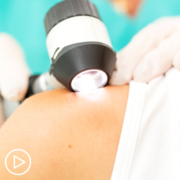What Do You Need to Know About Advanced Non-Melanoma Skin Cancer?
What Do You Need to Know About Advanced Non-Melanoma Skin Cancer? from Patient Empowerment Network on Vimeo.
What information is important for you and your loved ones to know after an advanced non-melanoma skin cancer diagnosis? This animated video reviews the types of advanced non-melanoma skin cancer, current treatment options, and important advice for engaging in your care.
What do you need to know if you or a loved one has been diagnosed with advanced non-melanoma skin cancer?
Non-melanoma skin cancer describes skin cancers that are not classified as “melanoma.” The main types of non-melanoma skin cancer include:
- Basal cell carcinoma
- Squamous cell carcinoma
- And Merkel cell carcinoma
When a non-melanoma skin cancer is large and deeply invasive, it is considered advanced. In these cases, the cancer is managed by a multidisciplinary team that could include a dermatologist and surgical, radiation, and medical oncologists.
Treatment recommendations are based on a variety of factors, including:
- The location and size of the cancer.
- Test results, including genetic test results.
- Potential treatment side effects.
- And the patient’s overall health and personal preferences.
If the cancer cannot be treated by surgery alone, treatment options may include:
- Chemotherapy
- Radiation therapy
- Targeted therapy
- Immunotherapy
- Or a clinical trial
Palliative care may be used in combination with these approaches to help reduce symptoms and to manage treatment side effects.
Now that you understand more about advanced non-melanoma skin cancer, how can you take an active role in your care?
- First, continue to educate yourself about your condition. Ask your healthcare team to recommend credible resources for information.
- Next, understand the goals of treatment and share your personal preferences with your doctor.
- Consider a second opinion with a specialist following a diagnosis to confirm your treatment approach.
- And write down your questions before and during your appointments. Visit powerfulpatients.org/skin to access office visit planners to help you organize your thoughts. Bring loved ones to your appointments to help you recall information and to keep track of important details.
- Ask your doctor whether a clinical trial might be right for you.
- Finally, remember that you have a voice in your care. Don’t hesitate to ask questions and to share your concerns. You are your own best advocate.
To learn more about advanced non-melanoma skin cancer and to access tools for self-advocacy, visit powerfulpatients.org/skin.













